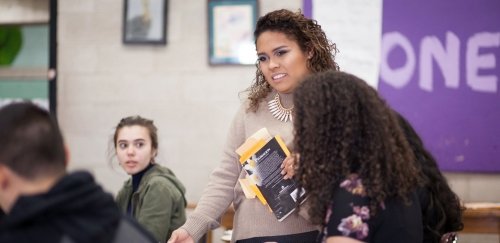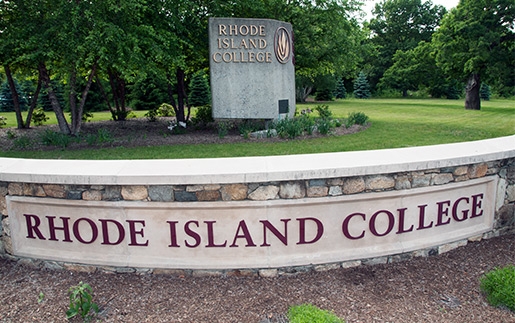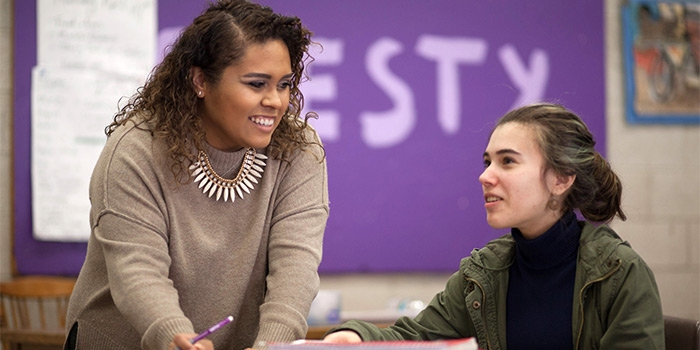The Making of a Teacher – Karen Ramirez’s Story
- News & Events
- News
- The Making of a Teacher – Karen Ramirez’s Story

First-generation Latina Karen Ramirez couldn’t be more talented, energized and prepared to join the ranks of racially diverse teachers in Rhode Island. Less than 5% of Rhode Island teachers are of color and only 2% are Latino.
A 2017 RIC graduate, with teacher certification in secondary English education and a minor in Portuguese, Ramirez is fluent in Spanish, Portuguese and English. More importantly, she has a deep and abiding love for teaching. Yet the path from student to teacher was filled with challenges, she said, not only for her but for many students of color who come from economically disadvantaged households.
“I think we need to pay attention to the financial reasons why many minority students don’t go on to college or drop out of college,” she said. “Often they have less ability to finance their education than students who come from affluent backgrounds.”
The eldest of two children, Ramirez was born in Central Falls, where the majority of the population is Latino and the median household income is less than $30,000. Her father died in her sophomore year of high school and her Guatemalan mother came near to foreclosing on their house after his death.
Though Ramirez knew she wanted to become a high school English teacher, she didn’t see how she could afford college. It was only through the financial support of the College Crusade of Rhode Island, RIC’s Preparatory Enrollment Program and a state grant that the possibility of earning a college degree became a reality.
Ramirez joined College Crusade in third grade, participating in the nonprofit’s after-school clubs, study skills workshops, career exploration activities, college application workshops, SAT preparation courses and much more. By the end of her senior year, College Crusade awarded her a $3,000 scholarship each year for her next four years of college.
Though generous, the scholarship was less than what she would need to cover the entire cost of tuition, fees and books at RIC, so her Crusade advisor assisted her in filling out an application for a state grant.
In 2010 Ramirez enrolled in RIC’s Preparatory Enrollment Program (PEP), which places a strong emphasis on first-year support services for first-generation students. PEP requires a pre-college summer immersion experience where students live in a residence hall on campus while taking college-level classes.

“It was great,” Ramirez recalled. “For a student whose parents weren’t college educated, that kind of introduction is important. It makes for a smoother transition to college.” PEP also paid Ramirez’s first two years of on-campus room and board and she had access to PEP advisors throughout her tenure at RIC.
Ramirez added that she also made a point of seeking out student support services on campus. She enrolled in a one-credit course offered by the Feinstein School of Education (FSEHD) called A.L.L.I.E.D. (Advanced Learning and Leadership Initiative for Educational Diversity), which is solely designed to provide academic support and advisement to underrepresented students who are entering the teaching field.
During A.L.L.I.E.D. meetings, students learn study skills, course planning and admission requirements to teaching programs. Presentations are given by representatives of support services on campus. At lunch hour, the students hold roundtables where they discuss their academic struggles and receive guidance from faculty advisors and their peers.
A.L.L.I.E.D. was founded and is led by Professor of Educational Studies Lesley Bogad. She said, “We believe that students need a place to feel at home, a place where they feel safe to speak about themselves as people from underrepresented groups. They find allies and friends in this group who help them feel more connected to RIC, to the Feinstein School of Education and to themselves. We have seen that this is an essential retention tool.”
The A.L.L.I.E.D. course is one that students can take over and over again every year. Thus, Ramirez continued to take the class when she knew a particular academic year would be stressful for her. She noted that the roundtables, in particular, were a great source of support.
The final hurdle in earning her teaching certificate was passing the PRAXIS II exam and completing her student teaching at Classical High School in Providence, both of which she successfully completed.

Reflecting back on her path from student to teacher, Ramirez said, “Coming from Central Falls, I guess you could say I came from the bottom. People always refer to Central Falls High School as the lowest-performing school, with the lowest test scores. Even as a student in Central Falls I was aware of that.”
“Yet minority teachers in Central Falls served as powerful role models for me. I felt that if they could go to college and become teachers, then maybe I could, too,” she said. “Inner-city students need to see themselves represented in their teachers. That’s a huge reason for having more teachers of color in the classroom.”
“My teachers at Central Falls were exceptional,” she said. “For instance, Mrs. Grant, sister of actress Viola Davis, was my English teacher. I was terrified of being in Mrs. Grant’s class because she would have these Socratic seminars and she always had such high standards for students. We knew we had to try our best in her class.”
Taking what she learned at Central Falls and at RIC, Ramirez is applying it in the classes she teaches. Her lesson plans, she said, are developed with an awareness for diversity and inclusion, a best practice she said she learned at RIC.
“Social justice was also brought up frequently by my professors in the education department,” said Ramirez. “As a student teacher, I was able to see the socio-economic divide in our schools and how it defines each school and the community within that school.”
Ramirez hopes to teach in Central Falls and to show her students that they can remake themselves as she has and move out of the cycle of poverty.
According to the U.S. Department of Education, “America’s racial and ethnic minorities are the fastest-growing sectors in the country and make up a disproportionately large segment of the economically poor population. The level of their educational achievements will dramatically affect the future of our nation.”
Ramirez is currently teaching secondary English ESL at Mount Pleasant High School and is enrolled in RIC’s M.Ed. in teaching English as a foreign language program. Upon completion, she will be ESL certified in the State of Rhode Island.
Ramirez’s story also appears in the Providence Journal. Go to: http://www.providencejournal.com/opinion/20170902/my-turn-anna-cano-morales-helping-all-rhode-islanders-soar
